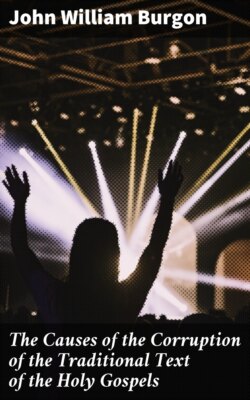Читать книгу The Causes of the Corruption of the Traditional Text of the Holy Gospels - John William Burgon - Страница 20
На сайте Литреса книга снята с продажи.
§ 4.
ОглавлениеTable of Contents
In other cases the source, the very progress of a blunder—is discoverable. Thus whereas St. Mark (in xv. 6) certainly wrote 'ενα δεσμιον, ΟΝΠΕΡ ητουντο, the scribe of Δ, who evidently derived his text from an earlier copy in uncial letters is found to have divided the Evangelist's syllables wrongly, and to exhibit in this place ΟΝ.ΠΕΡΗΤΟΥΝΤΟ. The consequence might have been predicted. [Symbol: Aleph]AB transform this into ΟΝ ΠΑΡΗΤΟΥΝΤΟ: which accordingly is the reading adopted by Tischendorf and by Westcott and Hort.
Whenever in fact the final syllable of one word can possibly be mistaken for the first syllable of the next, or vice versa, it is safe sooner or later to have misled somebody. Thus, we are not at all surprised to find St. Mark's 'α παρελαβον (vii. 4) transformed into 'απερ ελαβον, but only by B.
[Another startling instance of the same phenomenon is supplied by the substitution in St. Mark vi. 22 of της θυγατρος αυτου 'Ηρωδιαδος for της θυγατρος αυτης της 'Ηρωδιαδος. Here a first copyist left out της as being a repetition of the last syllable of αυτησ, and afterwards a second attempted to improve the Greek by putting the masculine pronoun for the feminine (ΑΥΤΟΥ for ΑΥΤΗΣ). The consequence was hardly to have been foreseen.]
Strange to say it results in the following monstrous figment:—that the fruit of Herod's incestuous connexion with Herodias had been a daughter, who was also named Herodias; and that she—the King's own daughter—was the immodest one[48] who came in and danced before him, 'his lords, high captains, and chief estates of Galilee,' as they sat at the birthday banquet. Probability, natural feeling, the obvious requirements of the narrative, History itself—, for Josephus expressly informs us that 'Salome,' not 'Herodias,' was the name of Herodias' daughter[49]—all reclaim loudly against such a perversion of the truth. But what ought to be in itself conclusive, what in fact settles the question, is the testimony of the MSS.—of which only seven ([Symbol: Aleph]BDLΔ with two cursive copies) can be found to exhibit this strange mistake. Accordingly the reading ΑΥΤΟΥ is rejected by Griesbach, Lachmann, Tregelles, Tischendorf and Alford. It has nevertheless found favour with Dr. Hort; and it has even been thrust into the margin of the revised Text of our Authorized Version, as a reading having some probability.
This is indeed an instructive instance of the effect of accidental errors—another proof that [Symbol: Aleph]BDL cannot be trusted.
Sufficiently obvious are the steps whereby the present erroneous reading was brought to perfection. The immediate proximity in MSS. of the selfsame combination of letters is observed invariably to result in a various reading. ΑΥΤΗΣΤΗΣ was safe to part with its second ΤΗΣ on the first opportunity, and the definitive article (της) once lost, the substitution of ΑΥΤΟΥ for ΑΥΤΗΣ is just such a mistake as a copyist with ill-directed intelligence would be sure to fall into if he were bestowing sufficient attention on the subject to be aware that the person spoken of in verses 20 and 21 is Herod the King.
[This recurrence of identical or similar syllables near together was a frequent source of error. Copying has always a tendency to become mechanical: and when the mind of the copyist sank to sleep in his monotonous toil, as well as if it became too active, the sacred Text suffered more or less, and so even a trifling mistake might be the seed of serious depravation.]
